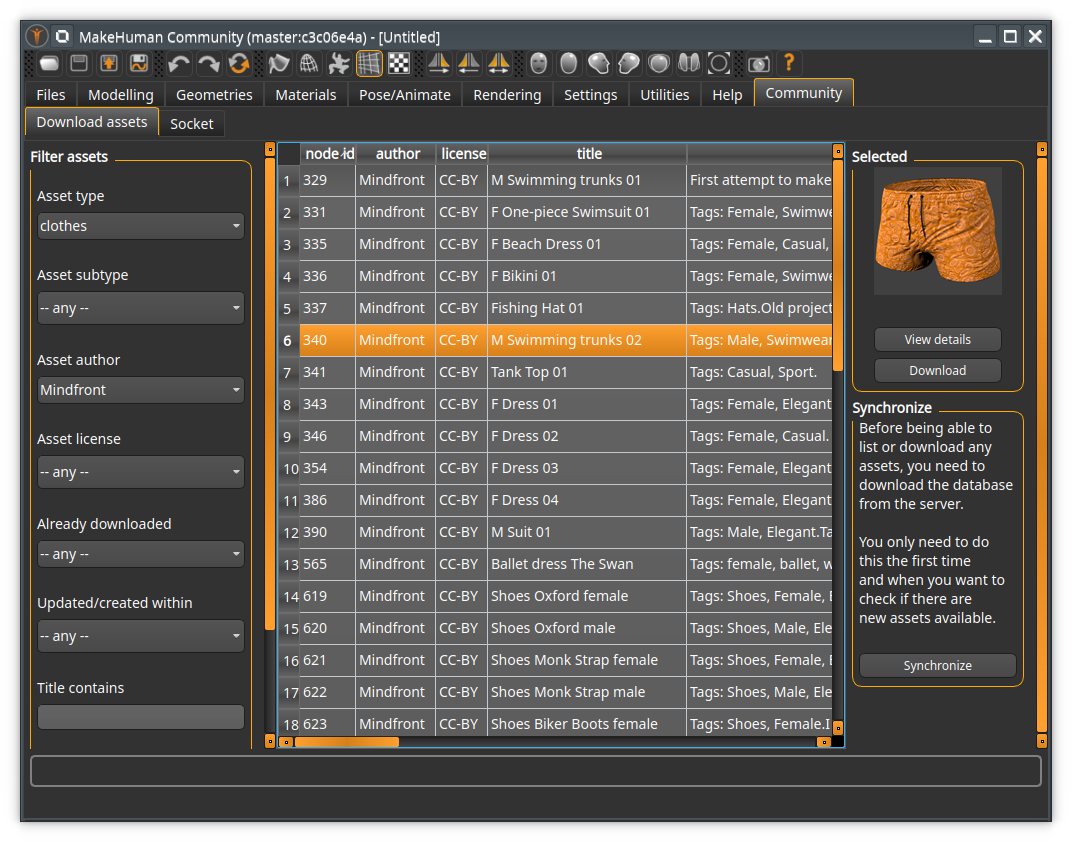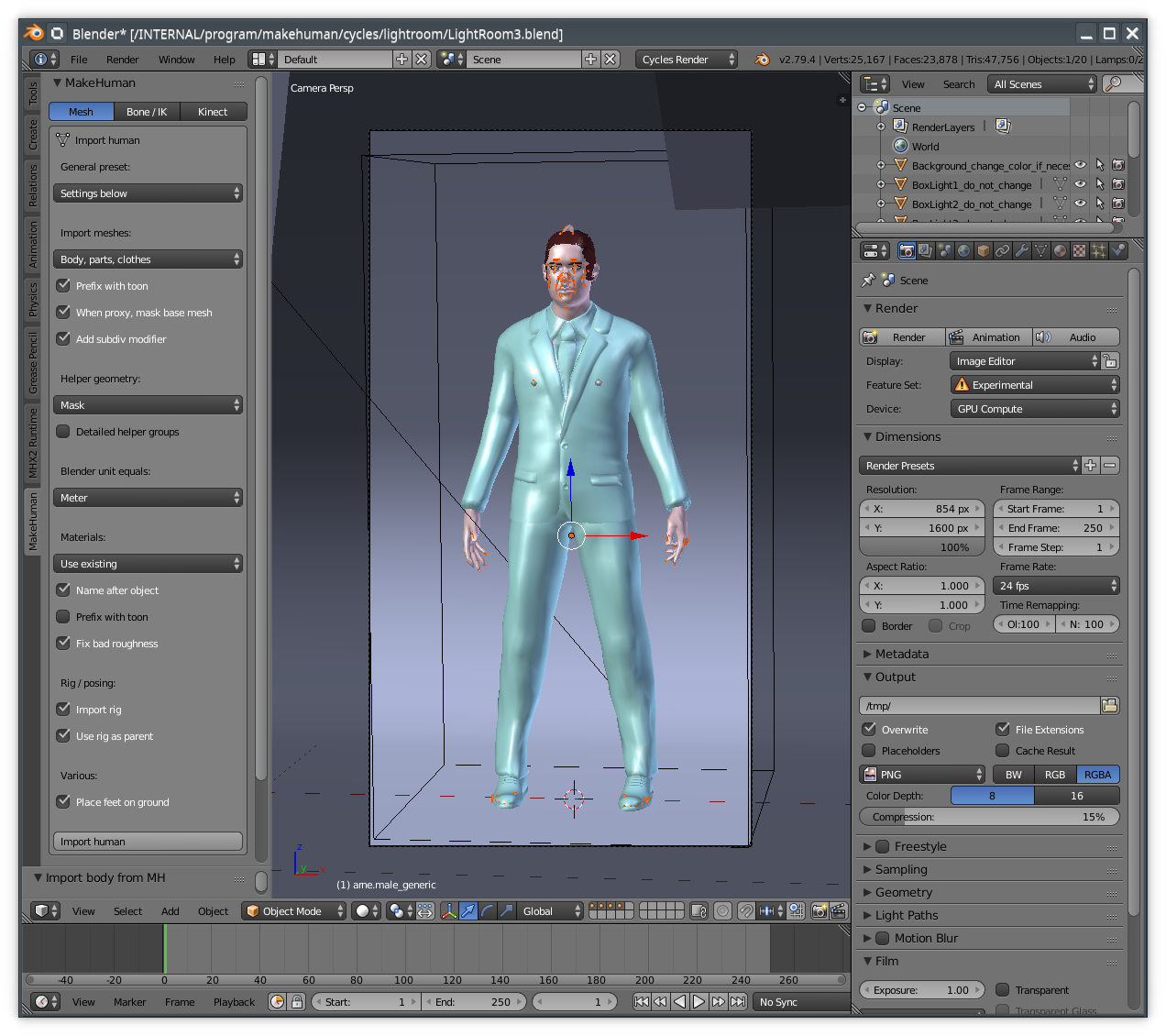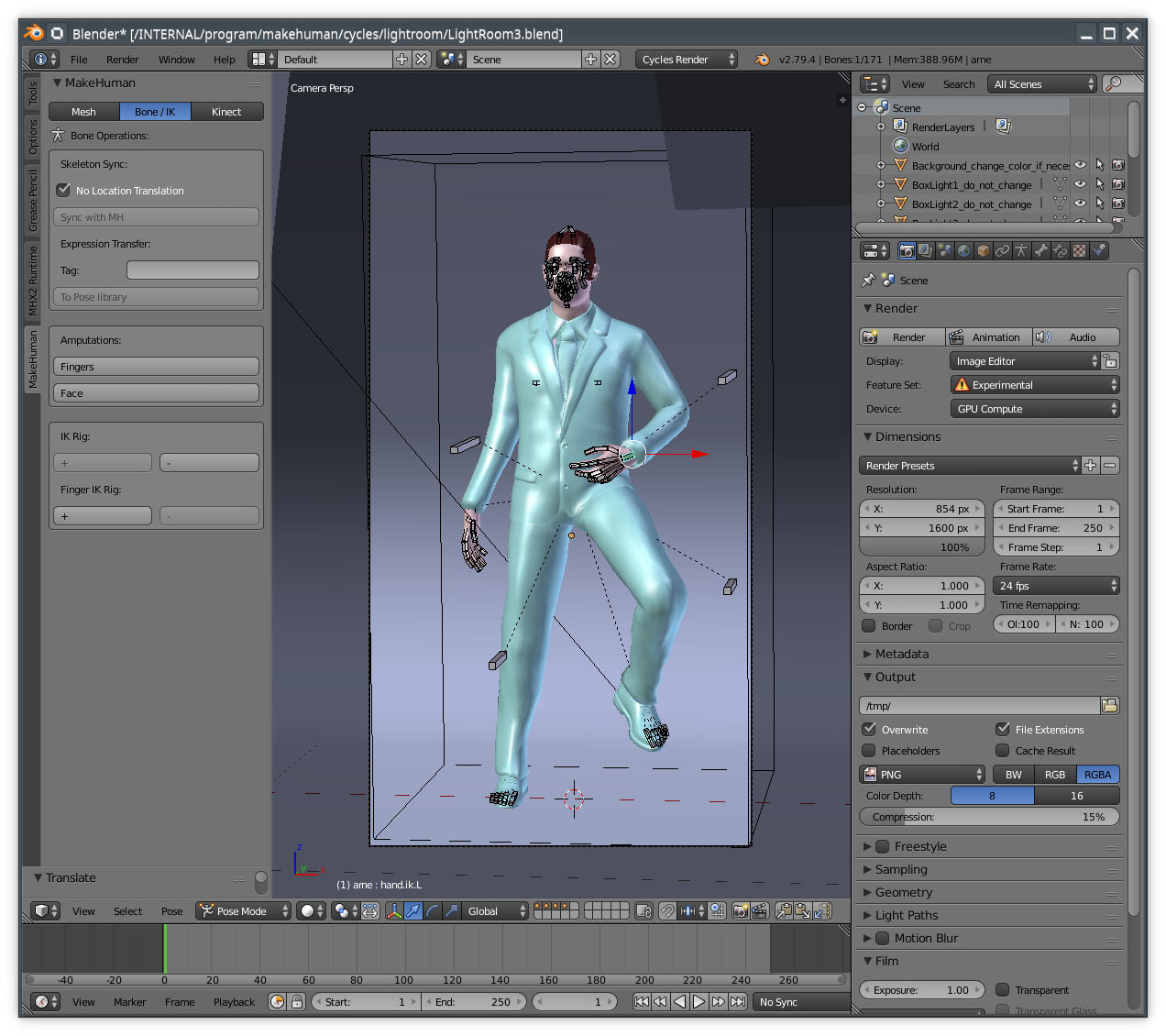Releases:120a3
MakeHuman Community 1.2.0 alpha3 was released 2019-03-19
It is important to understand that 1.2.0 alpha 3 is an alpha release. This means that things ‘‘will’’ behave strangely. Before downloading the build, you should at least read the “known issues” section in these notes.
These notes are under construction and may be incomplete. Further, the notes describe, as of now, an alpha version of a coming release. The final release might be different from what is described below.
General
In most cases, there should be no problem running versions 1.1.1 and 1.2.0 on the same system. They will not interfere with each other’s files. You can find download links for 1.2.0 at the bottom of this page.
“MakeHuman Community 1.2.0” is a major update of the underlying code, where the focus has been to replace outdated dependencies and modernize the system. Further, a shift in focus has been made to position MakeHuman as a shared tool serving the larger community through integrated access to third party assets and extended functionality.
The following are the changes since version 1.1.1.
Changes since alpha 2
- CORE: A crash that prevented makehuman from starting (or not showing any 3d models) on some AMD cards has been fixed
- CORE: A crash that arose when a mesh could not be loaded (for any reason, such as the file not existing) has been worked around.
- CORE: The whole pipeline should now gracefully accept tri meshes (in for example clothes). Note that mixed tri/quad meshes are still not supported: they need to be either tri or quad.
- CORE: Further measures have been taken to force all IO to be utf-8 on all platforms.
- CORE: A crash in proxy loading when using symlinks for makehuman home has been fixed
- CORE: It is possible to prevent values on rescan of custom target folders.
- CORE: The rig loading tab now recurses on subfolders, allowing to better organize the data.
- MODELING: The random functionality have been improved by ensuring symmetry in more body parts.
- LANGUAGE: A spelling mistake (“symmmetry”) has been corrected in most/all language files
- MASS PRODUCE: The “mass produce” plugin has been added. It allows randomizing large sets of characters automatically (see this youtube video). Note that when installing from PPA, you will have to install this explicitly. The package is named makehuman-community-plugins-massproduce.
- ASSET DOWNLOADER: It is now possible to download a single screenshot from the details panel
- ASSET DOWNLOADER: If the server for some reason protests (throws a 404 or similar), a sensible error message will now be shown to the user
- NEW BLENDER INTEGRATION: Now works with blender 2.80 (note that contrary to blender 2.79, the “makehuman” tab is on the “n” shelf rather than the “t” shelf)
- NEW BLENDER INTEGRATION: Now correctly sets up material nodes for normal maps.
- NEW BLENDER INTEGRATION: The code was refactored to get a structure that is a bit less messy
- NEW BLENDER INTEGRATION: The management of transparency was slightly improved, particularly for eevee
- NEW BLENDER INTEGRATION: Reduced the time it takes to import bone weights for a rigged character, by some 60%
- NEW BLENDER INTEGRATION: It is now possible to define a viewport color in mhmat files {keys: viewPortColor, viewPortAlpha}, which will affect the object appearance in Blender’s solid view mode
- SOCKET / NEW BLENDER INTEGRATION: It is now possible to configure host and port, meaning blender and makehuman can reside on different computers
- SOCKET / NEW BLENDER INTEGRATION: the “Allow connections” checkbox will remember its state across makehuman restarts (meaning the socket server will autostart if it was running when you last closed MH)
Highlights
- The codebase has received a major overhaul to bring it up to date with modern versions of Python and Qt
- Third party assets can be downloaded from within MakeHuman with a simple point and click procedure
- There is a completely new Blender integration, with support for socket transfers, IK and Kinect
- There is a new randomization functionality for generating large sets of randomized characters
- Improved internationalization support for non-ASCII characters (backported)
- Plugins in user space
- Plugins activation at runtime
- Improved tag sorting capabilities (Hotkey: ALT-F), including sticky tag provisions
- Tags for models (with configurable tag count)
- Show Name Tags instead of file names in the file loader.
- Saving model as target
- Real weight estimation
- Configurable location for the home folder
- MHX2 is bundled in the default installation
- Save thumbnails directly from the internal render engine
- There is a new installer for windows
- There is a new PPA for ubuntu. This PPA also offers builds of plugins.
- Using Jupyter for the shell utility, if available on the system (currently not working for MakeHuman windows builds)
Known issues
- FBX skeleton will still misbehave
- While most of the graphics card incompatibilities should now be fixed, there are still some (seldomly used) parts of the program that may cause problems with some intel cards.
- There is no build for OSX
- The user data folder is still makehuman/v1py3 rather than makehuman/v1, in order to guarrantee that the development version does not interfere with the stable version. This will probably be changed for the final release.
- The new blender importer will crash when used in a version of blender that is shipped with ubuntu 18.04. It works fine on ubuntu 18.04 if using a blender that is downloaded from blender’s homepage though. Users are recommended to ‘’not’’ use ubuntu’s version of blender.
- The new blender importer requires at least blender 2.79. It will not work with versions earlier than 2.79.
Upgrading
This version uses the same file formats as 1.1.x in almost all cases. The only exception is MHM files (which are produced when clicking “save model” in MakeHuman). 1.2.x is able to open MHM files produced in 1.1.x, and the result will look exactly the same as in 1.1.x. However, 1.1.x will not be able to open MHM files saved by 1.2.x.
For all other assets, things should work the same and look the same in both versions, using the same files.
Running from source
The source code is available at https://github.com/makehumancommunity/makehuman. You’ll also find basic instructions on how to use the source code on this page.
If you want to run MakeHuman directly from source (rather than downloading a binary build), you will have to replace almost all dependencies. It is also possible that not all dependencies will install smoothly beside the dependencies for 1.1.x.
The following are the minimum required dependency versions for MakeHuman Community 1.2.0:
- Python: 3.6.4 or higher
- PyQt: 5.10.0 or higher
- NumPy: 1.13.0 or higher
- PyOpenGL: Any modern version will work, including the one used for MakeHuman 1.1.x
Ubuntu
In order to fulfill the minimum dependency requirements listed above, you will need Ubuntu 18.04 or later. For earlier Ubuntu versions, you would have use backports of the dependencies, as they are not available in the default installation.
The PPA for this build is here: ppa:makehuman-official/makehuman-community.
To enable it, run:
sudo add-apt-repository ppa:makehuman-official/makehuman-community
sudo apt-get update
sudo apt-get install makehuman-community
Mint
The instructions for Ubuntu apply, but you will have to also explicitly install all plugins (whereas these will be installed automatically on Ubuntu)
sudo apt-get install makehuman-community-plugins-assetdownload makehuman-community-plugins-socket makehuman-community-plugins-massproduce mhx2-makehuman-exchange
The upgraded codebase
The main focus of this release has been to modernize the code. In the prior version, large parts were written more than eight years ago, and relied on libraries and code structures which are no longer functional in a modern context. More in detail:
- The system was written for python 2.6 and then upgraded when needed to python 2.7. The expected end of life for python 2.7 is in less than two years.
- The user interface was implemented in Qt4, via PyQt4. Both Qt4 and PyQt4 got deprecated years ago, and Riverside (the authors of PyQt) removed all PyQt4 windows binaries, meaning we could no longer provide windows builds.
Thus, the need to bring the code up to modern times became critical. We realized that the system would soon not be possible to run or develop on several platforms.
Going through the code to update it has taken some considerable time (years actually), but it has had the added benefit that we have also reviewed almost all sections of the code and fixed a lot of minor bugs and glitches.
Most users will probably not notice much difference: the user interfaces in 1.2.0 and 1.1.1 are almost identical. But it was work that needed to be done before we could move forward with implementing new features.
Asset downloader
This version of MakeHuman bundles the asset downloader plugin. By using this you can access all the hundreds of user contributed assets that are available via the MakeHuman Community.
Within the UI you can search for assets, show screenshots, read about details and download. Downloaded assets are automatically placed in your local asset directory so that you can immediately go to the geometries tabs and, for example, equip the newly downloaded clothes.
New blender integration
This release bundles a rich set of blender functionalitites, which can be added to blender in the form of an addon. Not all functionality will be listed here, but the following are some highlights.
Import directly from MakeHuman
In blender it is now possible to fetch a toon directly from a running instance of MakeHuman, without having to first save the toon to a file. The importer will talk with the makehuman instance and fetch all meshes (such as the body, hair clothes…), materials, rigs and poses. The process is almost instantaneous (a toon with a lot of clothes might take a few seconds to import).
The importer UI supports a wide range of settings and presets. By using a preset you can, for example, import a body mesh suitable for using together with MakeClothes. This will make it significantly easier to develop assets aimed at a specific body type.
Note that for the importer to work, you will have to go to the Community -> Socket tab in MakeHuman and enable “Accept connections”. Otherwise MakeHuman won’t answer, and you will get an error in Blender.
IK and amputations
The importer will use the skeleton set in MakeHuman to rig the resulting character in Blender. The rig can then be extended with the “IK rig” functionality: By clicking a button you can get extra IK controls, and IK chains set up for arms, legs and fingers.
Rigs can also be amputated in case detailed bones are not required.
All rigs currently available to MakeHuman are supported.
Kinect
To be written
The Mass Produce plugin
A new plugin is now bundled per default: The “mass produce” plugin. This allows rapidly generating large sets of randomized characters. The functionality is demonstrated in a youtube video:
{{#ev:youtube|jRHnJX-TdT4}}
A new windows installer
The windows version is now distributed as an executable installer that supports uninstall. After installing MakeHuman, it can now be found on the start menu like all other normal windows application.
Note that it is no longer recommended to go to the installation folder and start MakeHuman manually there. In order to do so, you would have to manually set up an environment for python, something which is handled automatically by the start menu entry.
Other bundled functionality
Apart from the above, some other functionality that previously had to be downloaded separately is now bundled:
MHX2
MHX2 is now enabled per default in MakeHuman. The blender side of MHX2 is bundled as a zip file which can be added to blender via the user preferences.
MHAPI
MHAPI (a library with convenience calls for making addons for MakeHuman) is now included and enabled per default.
Where to download
The following are links to where you can download alpha 3.
You can download the windows build here.
For linux, there is a new PPA.
Providing feedback and bug reports
As always with an alpha release, the important part is getting feedback and bug reports.
If in doubt, feedback and bug reports can always be posted on the forums. But more formal information about bug trackers can be found here: http://www.makehumancommunity.org/content/bugtracker.html


